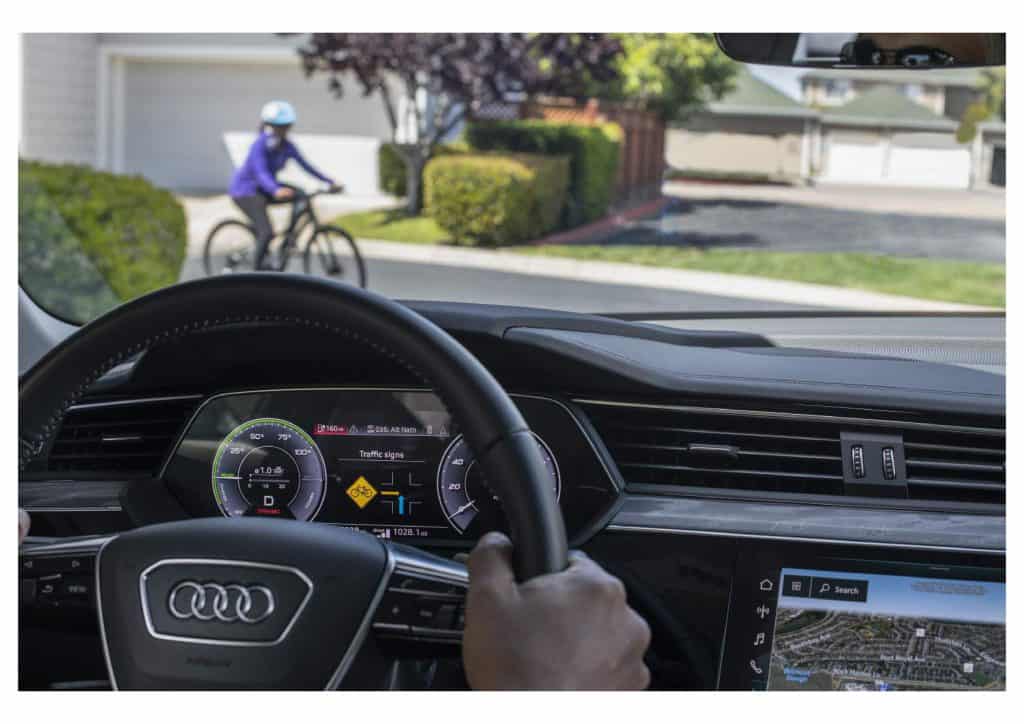
May is National Bike Safety Month, and while many steps have been taken to improve bike safety on urban and suburban roads, the next major opportunity may lie within new connected technologies, which can alert drivers when a bike is approaching, as well as alert cyclists of an approaching vehicle. With the National Highway Traffic Safety Administration (NHTSA) reporting that bicyclist fatalities increased by 38% from 2011 to 2020, C-V2X technology has the potential to make riding a bike safer than it is today by helping to avoid accidents with motor vehicles.
In March 2022, Audi of America announced that it was collaborating with Spoke, a mobility platform for safety, connectivity, and enriched rider experiences, along with other partners, to explore technical solutions for C-V2X with connected car-to-bicycle technologies to help reduce roadway accidents and fatalities involving motor vehicles and bicycles. The NHTSA reported 938 bicycle and other cyclist fatalities in 2020 alone.
In recent months, Audi has worked with critical tech providers to develop use cases focusing on bicycle safety in order to help make Audi vehicles’ onboard technology detect bicyclists and other vulnerable road users (VRUs). Also in progress is the development of alerts that can help prevent incidents among all road users. This is an important next step for bicycle safety as certain use cases currently could be accomplished with the use of other existing sensors (e.g. cameras, radar, lidar), but they may only work in certain situations. C-V2X PC5 allows these safety use cases to be realized in non-ideal situations, such as bad weather, faded road markings, obstructed sight lines, or sensor blinding obstacles.
The various bicycle use cases currently deployed include:
- Proximity Warning / Front & Rear Collision Warning
- Cross Traffic Alert (from left or right): Vehicle detects if bicycle is on collision path
- Rider Back Alert: A parallel parked vehicle when pulling out of its curbside spot detects if a bicycle is approaching from behind
- Right Turn Assist (“Right Hook”): Driver gives turn signal indication to turn right while cyclist intention is to drive straight through
- Left Turn Assist (“Left Cross”): Vehicle gives left turn indication and receives notification if cyclist is approaching from opposite direction and potentially entering turn of vehicle. Particularly useful if bicycle is obstructed from view by another vehicle
The NHTSA also reported that bicyclist fatalities were up 9.2% in 2020, the highest number since 1987. While many positive steps have and continue to be taken with road markings, warning signs, bike lanes, etc., C-V2X technology has the ability to potentially reduce bicycle injuries and fatalities in the mid-term. Audi has worked with Spoke, Qualcomm, Commsignia and other partners to bring the technology to life in the quest to make our roads safer for all.
In addition to bicycle safety use cases, Audi is also developing technology with the hopes of increasing safety for school bus users, school zones and construction zones, with further advancements for emergency vehicles expected to arrive in the future. The combination of all of these use cases and those that will be defined, represent a level of connectivity needed to enable automated driving, not yet available today.
At Audi of America, we believe the Future is Electric. By 2025, our U.S. model lineup will be 30 percent electrified, including fully electric and plug-in hybrid vehicles. Globally, we are committed to net CO2 neutrality by 2050. In 2021, Audi sold 196,038 vehicles in the U.S. and more fully electric models than ever before, with electric vehicle deliveries up by more than 50% over 2020. Learn more about who we are and how we’re working to create a more sustainable, innovative, and inclusive future at audiusa.com or media.audiusa.com.
This information is preliminary and subject to change. C-V2X technology is in development and not ready for consumer purchase at this time. Vehicle specifications subject to change.
Driver Assistance features are not substitutes for attentive driving. See Owner’s Manual for further details, and important limitations